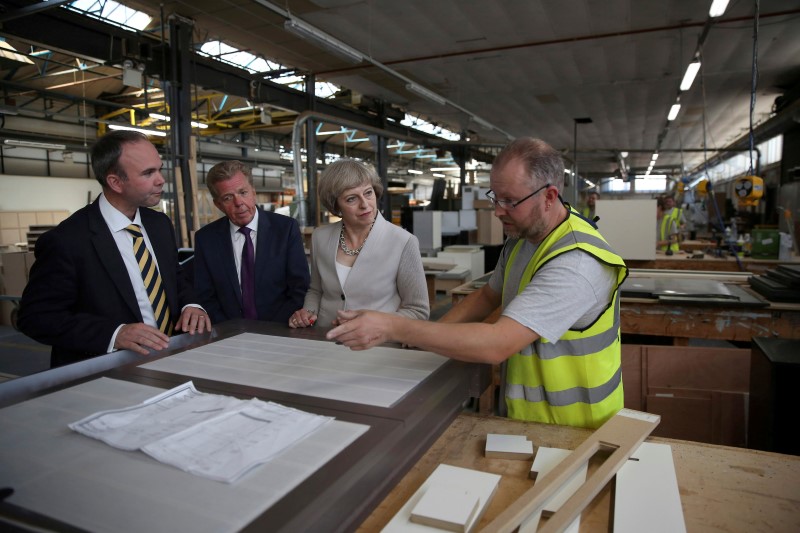By David Milliken
LONDON (Reuters) - British manufacturing staged one of its sharpest rebounds on record in August, a post-Brexit surprise that could prompt the Bank of England to rethink the need to cut interest rates again if other surveys confirm the trend.
The recovery far outstripped all economists' forecasts, delivering the strongest signal yet that Britain's economy is performing better than initially feared after the June 23 referendum vote to leave the European Union.
The Markit/CIPS Purchasing Managers' Index (PMI) - a closely watched gauge of factory activity - jumped to a 10-month high of 53.3 in August after tumbling to a three-year low of 48.3 in July in the immediate aftermath of the referendum.
Sterling soared by more than a cent against the dollar after the five-point monthly increase, which was the joint-largest in the manufacturing survey's nearly 25-year history.
"We would expect manufacturing exports to fare well post-Brexit because they gain from falling sterling, but the surprise is that domestic business picked up too," Investec economist Chris Hare said.
Manufacturing only makes up about 10 percent of Britain's economy but if the service sector PMI, due on Monday, shows the same trend, it would prompt a rethink among many economists about the short-term Brexit hit to Britain.
The BoE has predicted no growth in the economy in the second half of 2016 and members of its Monetary Policy Committee (MPC) have said they are ready to cut already record-low interest rates further.
"If the sharp rebound in the manufacturing PMI is mirrored in the services PMI, which covers more than half of the UK economy, chances are that the MPC would not cut Bank Rate in November," economists at Citi wrote in a note to clients.
Since the referendum, consumer demand has held up more strongly than economists expected but other surveys have shown businesses sharply cutting back on investment.
One of Britain's biggest recruiters, Hays Plc (LON:HAYS), said hiring weakened significantly shortly after the June 23 vote to leave the EU as private sector clients became hesitant to take on new staff.
The EEF manufacturers trade body said firms "appear to have their mojo back in August" but added the figures probably exaggerated the sector's true strength and would weaken.
Markit, which compiled the PMI, said companies restarted work they had put on hold in July as clients saw business starting to return to normal. There was also an inflow of new export orders on the back of a cheaper currency.
LONGER-TERM HIT?
After the unexpected Brexit vote, sterling fell by more than 10 percent against the dollar and the euro, losses that have not been recouped as markets bet on a long-term hit to British economic performance.
Weak PMI surveys in July suggested the economy had begun to contract at the fastest rate since the 2008-09 financial crisis and were a big factor behind the BoE's decision on Aug. 4 to cut rates to a record low and restart bond purchases.
Most of the bank's policymakers also expected to cut rates again this year if the economy worsened as they anticipated - something a repeat of Thursday's figures would call into doubt.
"There are growing indications that the true impact of higher uncertainty following the referendum will instead bleed in over time, rather than showing up conspicuously in one or two quarters," J.P. Morgan economist Allan Monks said.
August's manufacturing PMI showed export orders flowed in at their fastest rate since June 2014, though overall order growth was below June's rapid pace. Factories reported that they increased output by the highest amount since January.
A survey published last week had shown export orders rising at the fastest rate in two years in the first part of August, but more subdued domestic demand than the PMI.
In the longer run, Britain's access to European export markets remains uncertain. Prime Minister Theresa May's new government has not said when it will start formal talks to leave the EU and has given no detail on whether it would allow unlimited EU migration in return for continued easy trade access - a likely demand of other countries in the bloc.
The flip side of the short-run boost to exports from a weaker currency is signs of rising inflation pressure.
The PMI survey showed the biggest rise in input costs in more than five years and manufacturers raised the prices they charged customers at the sharpest rate since mid-2011.

The BoE expects higher inflation and lower living standards to be one of the main costs for households from the vote to leave the EU, outweighing gains to trade from a weaker currency.